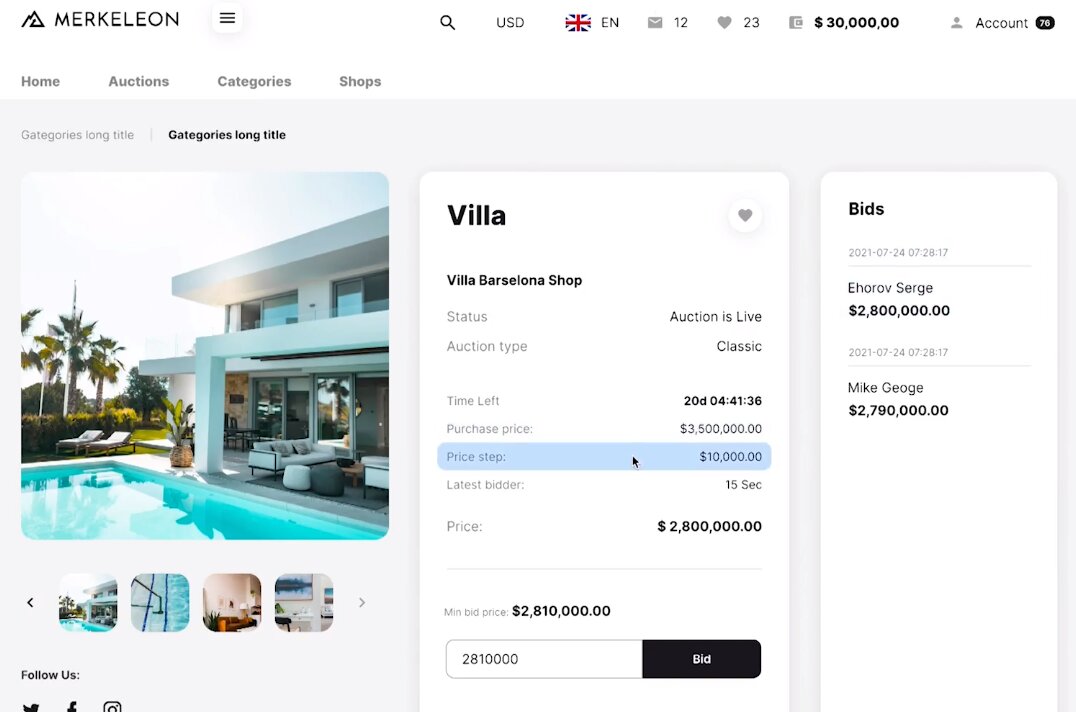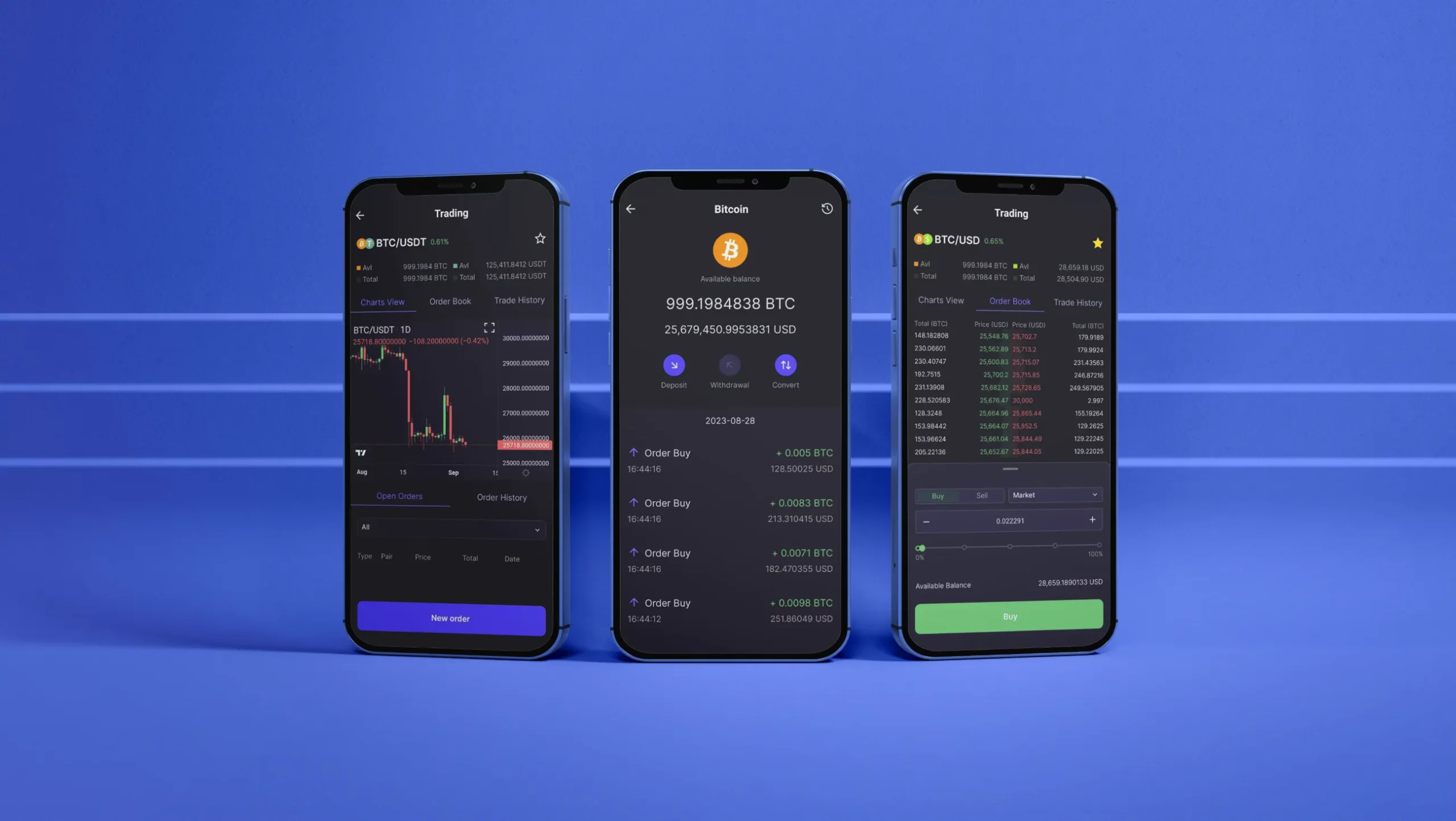- Crypto Solutions
- By business model
- By auction model
- Services
- Case studies
- Contact
500 years ago, the English started trading property at auctions. Now, real estate still goes off during bidding. With real estate auction software, it has become possible to launch websites for trading property.
In this article we shall uncover how property auctions work, how its software looks like, means of income, components. Finally, we present a checklist on how to set off such an auction.
Participants of Real Estate Auction Websites
There are 3 groups of users on such sites: a moderator, seller, buyer.
- Moderators watchdog deals. They arbitrate disputable cases, consult investors, approve users.
- Sellers, vendors, list property. They can be private owners, agents and investors.
- Buyers, bidders, purchase property. They can buy estate for themselves, as an investment, for resale.
Real Estate Online Auctions Review
These environments match sellers and buyers who want to trade property.
Sellers register by entering personal details: name, surname, address, email. License number, company and title are required for agents and investors.
After it, vendors list a property, specifying all the information about it: address, number of rooms, area size, utilities, neighborhood. A vendor also attaches relevant photos and documents. In the end, a vendor defines the flow of bidding: time, minimum price, deposit requirements. A listing is published.
Buyers come. They search for offers without registering on a platform. To bid, however, a buyer must register. During this step, buyers fill in personal data and bank card information.
When a buyer finds suitable property, they bid. A service freezes a deposit, 5% to 10% of an asked price. This measure protects vendors when a user wins but refuses to purchase the lot. Should this scenario happen, the money is withdrawn.
Bidding ends when time runs out or if no participant bids anymore. The vendor contacts the winner to discuss the terms of payment and transfer of authority. The winner’s deposit is included in the final payment. Other bidders’ deposits return to their bank accounts.
Prefs
Bidders can:
- Review lots;
- Compare lots;
- Bid in real-time 24/7;
- Use auto-bidding;
- Conclude deals remotely.
Sellers can:
- List several offers;
- Edit listings;
- Set bidding rules;
- Run bidding in real-time 24/7;
- Conclude deals remotely.
Flaws
Bidders cannot:
- See a lot on-site, only on photos;
- Review other bidders;
Sellers cannot:
- Guarantee that a lot will be sold at the end of bidding.
Features of Real Estate Auction Software
Real estate online auction software allows building a platform where buyers bid on property and buy it online. While vendors list real estate.
For bidders
With an inbuilt search engine, bidders look for property and filter it. They add listings to favorites to conveniently analyze offers. Sometimes real estate online auction software connects spreadsheets where bidders look at pending offers, their statuses and prices.
Algorithms allow bidding in real time. Software is instrumented with settable notifications: if a user is overbid, they get a notification. Also, software notifies bidders about new lots.
Various payment gateways can be connected via APIs. These can include means for payment in fiat and crypto. The latter is associated with lower service commissions. After all, crypto is being gradually adopted by the real estate community.
For sellers
Software for a real estate auction allows vendors to publish, edit, delete listings. Sellers attach photos and documents, write descriptions. In settings, vendors set bidding rules: time, bidding step, reserve price. The Buy Now option can be included.
There is a notification mechanism to inform a vendor about new bids. At the end of bidding if no one reaches the reserve price, a vendor annuls results, without selling the lot.
Channels of Income on Real Estate Online Auction
A service matches buyers with vendors and makes revenue. The sources of income are:
- Listing commissions. A service charges sellers for listing. This fee can be fixed or a percentage from an asked price.
- VIP commissions. Vendors pay a fee for promoting a listing to the top of the search.
- Commissions for using special tools. Buyers pay a fee for employing tools for bidding: auto-bidding, proxy bidding.
- Commissions for closing a deal. A vendor and winning bidder pay a fee for concluding a purchase. Some platforms charge vendors only.
Advertising is another revenue stream. Property auctions can collaborate with agents and firms who pay for every client the site engages.
Primary Components of Real Estate Online Auction Websites
To create a unique environment, you should put forward an outstanding feature that users will not find on other sites: loans, sales, discounts. The basic set of elements, nevertheless, should be present and top-notch.
Registration and login
Registration should include fields for entering user data: name, surname, address, email. It should have special fields for buyers, like bank card information. Agents and investors can be asked to enter their company, title, license. Registration can be connected to social networks: Facebook, Google, Apple.
To login, users enter their emails and passwords. If an account is linked with a social network, a user clicks the button Login Via X and enters their account.
Search scenario
Here come navigation and filtering. Navigation should be user-friendly, with the option to check basic information about a lot in the search field. Users tag a listing favorite or start bidding, without opening a separate tab of a lot.
Filtering helps limit listings according to buyer’s preferences. It includes price range, neighborhood choice, the size of a property, the number of rooms, available utilities, etc. There can be features like Sort By to arrange offers from the newest to the oldest or the most expensive to the cheapest.
A real estate auction destination can have categories. Classification can be based on the purpose of property: office, land, industry, retail and so on. Real estate can be sorted out by ownership: private property, bank property, government property.
Description page
On this page, users view detailed information about a lot. A description page should include photos, a description, address, asked price, timer, map, 3D tour. Here can be the Buy Now button to get a lot without bidding. For commercial estate there can be information about passability, commercial rates, etc.
Listing page
A listing page provides functionality for listing an estate. Here sellers write descriptions, enter details about the size of property, number of rooms, adjacent area. On a listing page, vendors download photos. Many sites require that photos be of specific parameters: size, resolution, format. These parameters are usually written next to a download field.
Besides, sellers configure the rules of bidding on a listing page to minimize costs and maximize profit. They select the time period, reserve price, Buy Now price, deposit requirements.
A listing page has functionality for attaching documents, with requirements as to their format and size stated. Moreover, vendors specify payment information. 3D tours are popular among buyers. So, a website offers sellers to create 3D tours.
User panel
Here, users, vendors and buyers, edit profile information. Agents and brokers modify license details. Buyers fill in card information. They check the status of a bidding they participate in. Plus, buyers glance through saved listings and evaluate them. Sellers track the flow of bidding. They edit and publish listings.
Auction calendar
A calendar component helps control events. When a vendor initiates bidding, they set a start date. Buyers willing to partake in this bidding ask a website to notify about the event. Or after they add a listing to favorites, its start date automatically appears in the calendar.
How to Set Real Estate Online Auction Platform?
- Inspect the domain of real estate, the market and competitors. What makes this service popular? What are its strengths? Drawbacks? What path does a user take to accomplish their objective?
- Set goals. What audience do you want to attract? What countries will your website cover? What property will be listed on your platform? How will users know about your website?
- Make a difference. Researching the sphere, you might come up with ideas to improve existing auctions. Think about functionality that will give prominence to your site. What features will attract a bigger audience? Do users need a mobile app?
- Choose a developer. Decide whether you develop software yourself or purchase it ready-made. Also answer these questions: what is your software budget? When do you plan to launch a website? Who will maintain the service?
- Develop a minimum viable product (MVP). When developing software from scratch, you should build a sample version of a final product. Then, test it among users. What to fix? What do users think about functionality? Is the interface user-friendly enough?
- Finalize software. Receiving feedback for an MVP, you brush up software. If the solution is turnkey, you adjust it to your business.
Bottomline
Real estate online auctions are a widespread phenomenon in the USA. More platforms emerge in Europe. Real estate is a sphere existing chiefly offline. That said, Internet platforms that join buyers with sellers can boost the industry and bring profit to pioneers.








